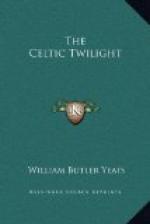and sure enough the next time she was angry. ’Ye
didn’t believe me,’ she said, ’and
ye threw the herb I gave ye in the fire, and I went
far enough for it.’ There was another time
she came and told how William Hearne was dead in America.
‘Go over,’ she says, ’to the Lough,
and say that William is dead, and he died happy, and
this was the last Bible chapter ever he read,’
and with that she gave the verse and chapter.
‘Go,’ she says, ’and tell them to
read them at the next class meeting, and that I held
his head while he died.’ And sure enough
word came after that how William had died on the day
she named. And, doing as she did about the chapter
and hymn, they never had such a prayer-meeting as
that. One day she and me and my mother was standing
talking, and she was warning her about something, when
she says of a sudden, ’Here comes Miss Letty
in all her finery, and it’s time for me to be
off.’ And with that she gave a swirl round
on her feet, and raises up in the air, and round and
round she goes, and up and up, as if it was a winding
stairs she went up, only far swifter. She went
up and up, till she was no bigger than a bird up against
the clouds, singing and singing the whole time the
loveliest music I ever heard in my life from that
day to this. It wasn’t a hymn she was singing,
but poetry, lovely poetry, and me and my mother stands
gaping up, and all of a tremble. ‘What
is she at all, mother?’ says I. ’Is
it an angel she is, or a faery woman, or what?’
With that up come Miss Letty, that was your grandmother,
dear, but Miss Letty she was then, and no word of her
being anything else, and she wondered to see us gaping
up that way, till me and my mother told her of it.
She went on gay-dressed then, and was lovely looking.
She was up the lane where none of us could see her
coming forward when the Wee Woman rose up in that queer
way, saying, ‘Here comes Miss Letty in all her
finery.’ Who knows to what far country
she went, or to see whom dying?
“It was never after dark she came, but daylight
always, as far as I mind, but wanst, and that was
on a Hallow Eve night. My mother was by the fire,
making ready the supper; she had a duck down and some
apples. In slips the Wee Woman, ‘I’m
come to pass my Hallow Eve with you,’ says she.
‘That’s right,’ says my mother, and
thinks to herself, ’I can give her her supper
nicely.’ Down she sits by the fire a while.
’Now I’ll tell you where you’ll
bring my supper,’ says she. ’In the
room beyond there beside the loom—set a
chair in and a plate.’ ’When ye’re
spending the night, mayn’t ye as well sit by
the table and eat with the rest of us?’ ’Do
what you’re bid, and set whatever you give me
in the room beyant. I’ll eat there and
nowhere else.’ So my mother sets her a
plate of duck and some apples, whatever was going,
in where she bid, and we got to our supper and she
to hers; and when we rose I went in, and there, lo
and behold ye, was her supper-plate a bit ate of each
portion, and she clean gone!”




